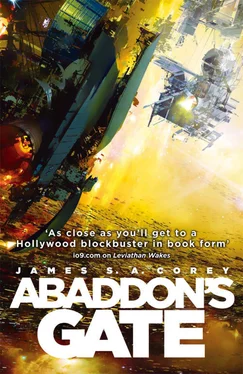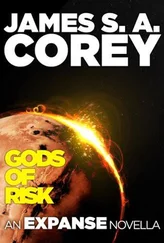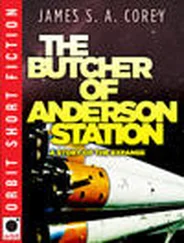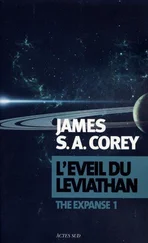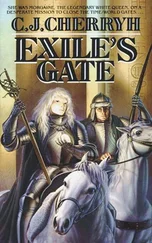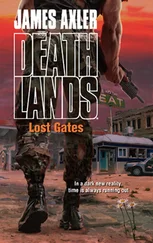For a fraction of a second, his brain tried to fit two images—Miller floating beside him and the too-small cell—together and failed. The flesh on his back felt like there were insects crawling all over it. The two things couldn’t both be true, and his brain shuddered and recoiled from the fact that they were. Miller coughed.
“Don’t do that,” he said. “This is hard enough the way it is. What I mean by if is that lockdown’s lockdown. I don’t get to pick what part of the trap gets unsprung. If I take off the dampening and you all start burning for home or shooting at each other or whatever, that means I also open the gates. All of them.”
“Including the ones with the burned-up stars?”
“No,” Miller said. “Those gates are gone. Only real star systems on the other side of the ones that are left.”
“Is that a problem?”
“Depends on what comes through,” Miller said. “That’s a lot of doors to kick down all at once.” The only sound was the hiss of the air recyclers. Miller nodded as if Holden had said something. “The other option is figure out a way to sneak back home with your tails between your legs and try and pretend this all never happened.”
“You think we should do that?”
“I think there was an empire once that touched thousands of stars. The Eros bug? That’s one of their tools. It’s a wrench. And something was big enough to put a bullet in them . Whatever it is could be waiting behind one of those gates, waiting for someone to do something stupid. So maybe you’d rather set up shop here. Make little doomed babies. Live and die in the darkness. But at least whatever’s out there stays out there.”
Holden put his hand on the crash couch to steady himself. His heart was beating a mile a minute, and his hands were clammy and pale. He felt like he might throw up, and wondered whether he could get the vacuum commode working in time. In his memory, stars died.
“You think that’s what we should do?” he asked. “Be quiet and get the hell out of here?”
“No, I want to open ’em. I’ve learned everything I can get from here, especially in lockdown. I want to figure out what happened, and that means going and taking a look at the scene.”
“You’re the machine that finds things.”
“Yes,” Miller said. “Consider the source, right? You might want to talk about it with someone who’s not dead. You people have more to lose than I do.”
Holden thought for a moment, then smiled. Then laughed.
“I’m not sure it matters. I’m not in much of a position to set policy,” he said.
“That’s true,” Miller said. “Nothing personal, but you’ve got lousy taste in friends.”
Chapter Thirty-One: Melba
She was in her prison cell when they spun up the drum. In its previous life, the cell had been some sort of veterinary ward for large animals. Horses, maybe. Or cows. A dozen stalls, six to a side, with brushed steel walls and bars. Real bars, just like all the old videos, except with a little swinging door at the top where they could shovel in hay. Everything else was antiseptic white. Everything was locked. Her clothes were gone, replaced by a simple pale pink jumpsuit. Her hand terminal was gone. She didn’t miss it. She floated in the center of the space, the walls just out of reach of her fingers and toes. It had taken a dozen attempts, reaching the wall and pushing back more and more gently, to find just the right thrust for the air resistance to stop her out where nothing could touch or be touched. Where she could float and be trapped by floating.
The man in the other cell bounced off his walls. He laughed and he shouted, but mostly he sulked. She ignored him. He was easy to ignore. The air surrounding her had a slight breeze, the way everything did in a ship. She’d heard a story once on the way out about a ship whose circulation failed in the middle of a night shift. The whole crew had died from the zone of exhausted gas that bubbled around them, drowning in their own recycled air. She didn’t think the story was true, because they would have woken up. They would have gasped and thrashed around and gotten up out of their couches, and so they would have lived. People who wanted to live did that. People who wanted to die, on the other hand, just floated.
The Klaxons sounded through the whole ship, the blatting tone resonating through the decks, taking on a voice like a vast trumpet. First, a warning. Then another. Then another. Then, silently, the bars retreated from her, falling away, and the back wall touched her shoulder like it wanted her attention but hesitated to ask. Inch by inch, her skin came to rest against the wall. For almost half a minute, the wall touched her, its energy and her inertia pressing them together like praying hands. The drum’s acceleration was invisible to her. She only felt the spin sweeping her forward, and then because forward, down. Her body slid inch by inch, moving down the wall toward the deck. Her body began to take on weight; the joints in her knees and spine shifting, bearing load. She remembered reading somewhere that a woman coming back from a long time at null g could have grown almost two inches just from the disks in her spine never having the fluid pushed out of them. Between that and the muscle atrophy, coming back to weight—spin, thrust, or gravity—was the occasion for the most injury. Spinal disks were supposed to be pushed on, supposed to have the fluids go into them and back out. Without that, they turned into water balloons, and sometimes, they popped.
Her knee brushed the floor, then pressed into it. It had to have been an hour or more since the Klaxons. Up and down existed again, and she let down take her. She folded against herself, empty as damp paper. There was a drain in the floor, white ceramic unstained by any animal’s blood or piss. The lights overhead flickered and grew steady again. The other prisoner was shouting for something. Food, maybe. Water. A guard to escort him to the head.
It was natural to think of it as the head now. Not the restroom. Not the water closet. She didn’t call for anyone to help her, she just felt her body grow heavier, being pulled down. And because down, out. It wasn’t real gravity, so it wasn’t real weight. It was her mass trying to fly off into the dark and being restrained. Someone came for the other prisoner. She watched the thick plastic boots flicker across her line of sight. Then voices. Words like loyal and mutiny . Phrases like When the time’s right and Restore order . They washed over her and she let them go. Her head hurt a little where her temple pushed against the floor. She wanted to sleep, but she was afraid to dream.
More footsteps, the same boots going the other way, passing her. More voices. The boots coming back. The deep metallic clank of the shackle being taken off the stall’s door. Her body didn’t move, but her attention focused. The guard was different. A woman with broad shoulders and a gun in her hand. She looked at Melba, shrugged, and put a hand terminal into her field of vision.
The man on the screen didn’t look like a cop. His skin was pale brown, like cookie dough. There was something strange about the shape of his face—broad chin, dark eyes, wrinkles in his forehead and the corners of his mouth—that she couldn’t place until he spoke and she saw him in motion. Then it was clear he was lying down and looking up at the camera.
“My name’s Carlos Baca,” the lying-down man said. “I’m in charge of security on the Behemoth . So this prison you’re in? It’s mine.”
All right , Melba thought.
“You, now. I’m thinking you got a story to tell. The UN records of your DNA says you’re Melba Koh. A bunch of people I’ve got no reason to disbelieve say you’re Clarissa Mao. The XO of the Rocinante says you tried to kill her, and this Russian priest lady’s backing her story. And then there’s this sound engineer who says you hired him to place interruption electronics on the Rocinante .” He went quiet for a moment. “Any of that ringing a bell?”
Читать дальше
